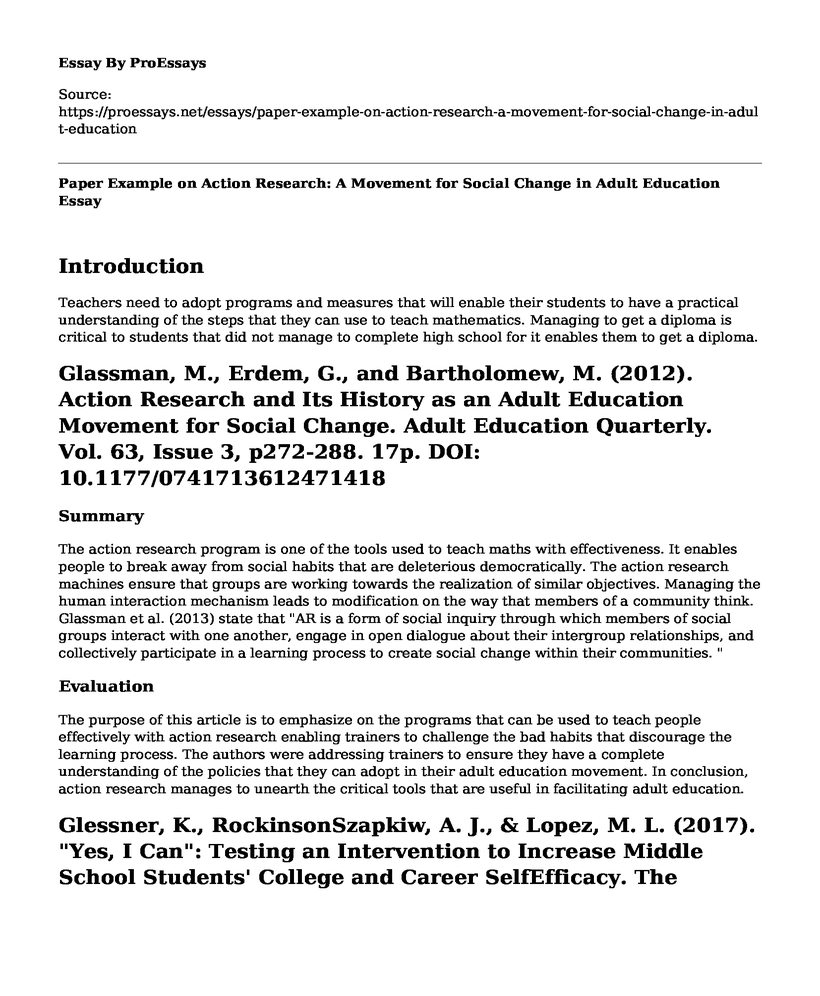Introduction
Teachers need to adopt programs and measures that will enable their students to have a practical understanding of the steps that they can use to teach mathematics. Managing to get a diploma is critical to students that did not manage to complete high school for it enables them to get a diploma.
Glassman, M., Erdem, G., and Bartholomew, M. (2012). Action Research and Its History as an Adult Education Movement for Social Change. Adult Education Quarterly. Vol. 63, Issue 3, p272-288. 17p. DOI: 10.1177/0741713612471418
Summary
The action research program is one of the tools used to teach maths with effectiveness. It enables people to break away from social habits that are deleterious democratically. The action research machines ensure that groups are working towards the realization of similar objectives. Managing the human interaction mechanism leads to modification on the way that members of a community think. Glassman et al. (2013) state that "AR is a form of social inquiry through which members of social groups interact with one another, engage in open dialogue about their intergroup relationships, and collectively participate in a learning process to create social change within their communities. "
Evaluation
The purpose of this article is to emphasize on the programs that can be used to teach people effectively with action research enabling trainers to challenge the bad habits that discourage the learning process. The authors were addressing trainers to ensure they have a complete understanding of the policies that they can adopt in their adult education movement. In conclusion, action research manages to unearth the critical tools that are useful in facilitating adult education.
Glessner, K., RockinsonSzapkiw, A. J., & Lopez, M. L. (2017). "Yes, I Can": Testing an Intervention to Increase Middle School Students' College and Career SelfEfficacy. The Career Development Quarterly, 65(4), 315-325.
Summary
Trainers and other relevant stakeholders should understand the methods that they can use to promote the training process of middle-school learners. Suggestions are raised on the need to use the community-based and virtual means by relying on the self-efficacy theory. Some of the strategies that can be adopted include affective states, mastery experiences, verbal persuasion, and vicarious experiences. The authors state that "online career program, Florida CHOICES, combined with a college visit, can increase middle school students' college-going and career decision self-efficacy."
Evaluation
The purpose of this article is to offer evidence on the intervention programs that can be adopted to train college students. The report was directed to trainers to understand the measures that they can take to ensure that they are well-equipped in their various undertakings and desire to offer quality services to their students. In conclusion, following the self-efficacy theory measures, such as mastery experiences are useful in facilitating the training of maths among college-students.
Yang, E. F., Chang, B., Cheng, H. N., & Chan, T. W. (2016). Improving pupils' mathematical communication abilities through computer-supported reciprocal peer tutoring. Journal of Educational Technology & Society, 19(3), 157.
Summary
Understanding the written and spoken maths is useful in the learning process of a student, and the reciprocal peer tutoring tools that are computer-supported are critical in realizing this goal. The program involves having paired students with either one of them taking the role of a tutor, and the other becomes a tutee. The tutor trainers the other on the reasons and the procedure that they can follow to find a solution to the word problem through the math creation process. The tutee is required to ask questions on the solution strategies that are being implemented.
Evaluation
The purpose of this article is to raise the programs that can be used to ensure that learners manage to understand maths communication procedures. Yang et al. (2016) address method trainers and students can use on the policies that they can adopt to realize their dreams in this course. The maths communication programs enable people to interact and exchange ideas enabling them to express their maths concepts. The peer-support program is a useful tool that enables learners to get a deeper understanding of the maths subject.
References
Glassman, M., Erdem, G., and Bartholomew, M. (2012). Action Research and Its History as an Adult Education Movement for Social Change. Adult Education Quarterly. Vol. 63, Issue 3, p272-288. 17p. DOI: 10.1177/0741713612471418
Glessner, K., RockinsonSzapkiw, A. J., & Lopez, M. L. (2017). "Yes, I Can": Testing an Intervention to Increase Middle School Students' College and Career SelfEfficacy. The Career Development Quarterly, 65(4), 315-325.
Yang, E. F., Chang, B., Cheng, H. N., & Chan, T. W. (2016). Improving pupils' mathematical communication abilities through computer-supported reciprocal peer tutoring. Journal of Educational Technology & Society, 19(3), 157.
Cite this page
Paper Example on Action Research: A Movement for Social Change in Adult Education. (2023, Mar 26). Retrieved from https://proessays.net/essays/paper-example-on-action-research-a-movement-for-social-change-in-adult-education
If you are the original author of this essay and no longer wish to have it published on the ProEssays website, please click below to request its removal:
- Stress in Children - Course Work Example
- Annotated Bibliography: How Smartphones and Tablets Affect Children's Development?
- Distinguishing Science From Pseudoscience Paper Example
- Critical Thinking on M. Butterfly and Oleanna Plays
- School Property Tax Debate Reaches PA: Argall's Tax Shift Plan Criticized - Essay Sample
- Paper Example on Researching Childhood Depression: Causes & Treatment
- Essay Example on Adolescents Need Supportive Environments for Positive Development







